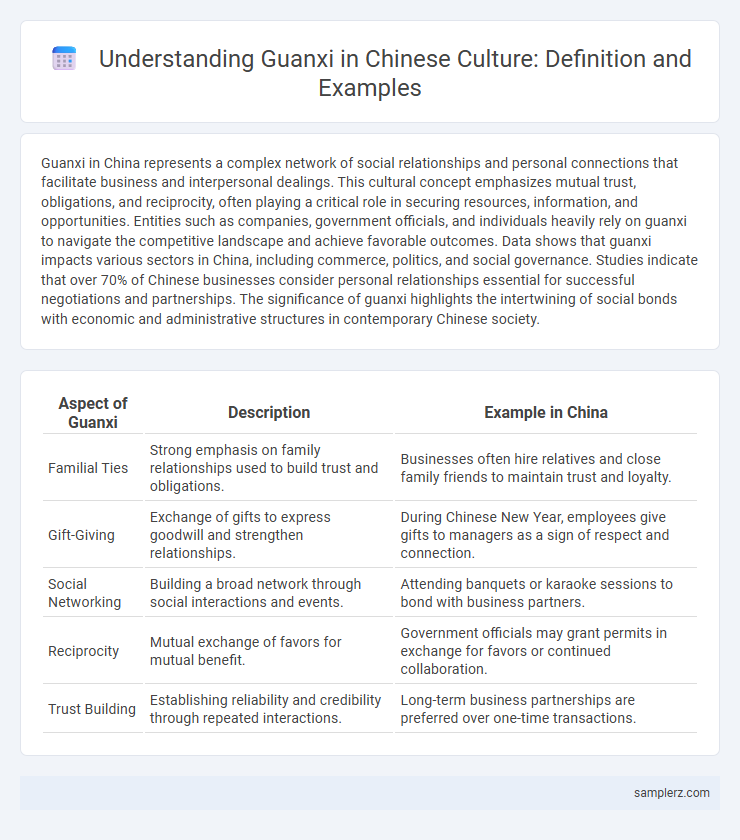Guanxi in China represents a complex network of social relationships and personal connections that facilitate business and interpersonal dealings. This cultural concept emphasizes mutual trust, obligations, and reciprocity, often playing a critical role in securing resources, information, and opportunities. Entities such as companies, government officials, and individuals heavily rely on guanxi to navigate the competitive landscape and achieve favorable outcomes. Data shows that guanxi impacts various sectors in China, including commerce, politics, and social governance. Studies indicate that over 70% of Chinese businesses consider personal relationships essential for successful negotiations and partnerships. The significance of guanxi highlights the intertwining of social bonds with economic and administrative structures in contemporary Chinese society.
Table of Comparison
| Aspect of Guanxi | Description | Example in China |
|---|---|---|
| Familial Ties | Strong emphasis on family relationships used to build trust and obligations. | Businesses often hire relatives and close family friends to maintain trust and loyalty. |
| Gift-Giving | Exchange of gifts to express goodwill and strengthen relationships. | During Chinese New Year, employees give gifts to managers as a sign of respect and connection. |
| Social Networking | Building a broad network through social interactions and events. | Attending banquets or karaoke sessions to bond with business partners. |
| Reciprocity | Mutual exchange of favors for mutual benefit. | Government officials may grant permits in exchange for favors or continued collaboration. |
| Trust Building | Establishing reliability and credibility through repeated interactions. | Long-term business partnerships are preferred over one-time transactions. |
Business Networking: How Guanxi Shapes Corporate Success
Guanxi, the intricate network of personal relationships in China, plays a pivotal role in business networking by facilitating trust and reciprocal favors among corporate partners. This cultural practice significantly influences decision-making, resource allocation, and negotiation processes, often determining the success of business ventures. Companies leveraging guanxi can secure exclusive deals, access insider information, and establish long-term partnerships critical for competitive advantage in the Chinese market.
Family Ties and Guanxi in Traditional Chinese Society
Family ties form the core of guanxi in traditional Chinese society, where networks of mutual obligation and trust are built through kinship bonds. These relationships facilitate social support, business cooperation, and political influence, reinforcing hierarchical structures and reciprocal favors among relatives. Guanxi rooted in family connections remains a crucial mechanism for navigating social and economic activities in China.
Government Relations: Guanxi in Political Circles
Guanxi in China's political circles plays a crucial role in facilitating government relations, where personal networks often determine access to resources and decision-making processes. Political officials leverage guanxi to build trust, secure favors, and navigate bureaucratic complexities, influencing policy implementation and regulatory approvals. This system underlines the intertwined nature of social relationships and power dynamics within China's governance framework.
Gift-Giving and Reciprocity: Social Customs of Guanxi
In China, guanxi emphasizes gift-giving as a pivotal practice to establish and maintain social networks, where the exchange of presents symbolizes respect and mutual obligation. Reciprocity is essential, as failing to reciprocate gifts can damage trust and social bonds within guanxi relationships. This custom reinforces a cycle of favor exchange, fostering long-term cooperation and social harmony in personal and business interactions.
Academic Opportunities: Guanxi’s Role in Education
Guanxi in China significantly impacts academic opportunities by fostering networks between students, educators, and institutions, facilitating access to coveted scholarships and research collaborations. This interpersonal relationship system often influences admissions decisions and resource allocation, enabling those with well-established connections to gain preferential treatment. Schools and universities leverage guanxi to build partnerships, enhance reputations, and secure competitive advantages within China's rigorous educational landscape.
Urban vs. Rural: Different Forms of Guanxi in China
Guanxi in urban China often revolves around professional networks and business exchanges, where relationships are cultivated to gain competitive advantages and access to resources. In contrast, rural guanxi tends to emphasize kinship ties and community bonds, reinforcing mutual support and social obligations within village settings. These differing forms highlight the adaptation of guanxi to distinct socio-economic environments across China.
Guanxi in Job Hunting and Career Advancement
Guanxi in China plays a crucial role in job hunting and career advancement by leveraging personal relationships and networks to access job opportunities and secure promotions. Employers often prioritize candidates who come recommended through trusted connections, reflecting the deep-rooted cultural emphasis on loyalty and mutual obligation. This system enhances career mobility but can also create challenges for those outside established social circles.
Everyday Life: Guanxi in Consumer and Service Interactions
Guanxi plays a crucial role in everyday consumer interactions in China, where personal relationships often influence purchasing decisions and service quality. Local markets and shops frequently prioritize customers with established connections, enhancing trust and personalized treatment. This network-based exchange shapes consumer behavior, embedding social bonds into routine transactions.
Challenges and Ethical Issues Surrounding Guanxi
Guanxi in China presents significant ethical challenges, including potential conflict of interest, nepotism, and corruption risks that undermine merit-based systems. The blurred lines between personal relationships and professional obligations often lead to favoritism, hindering transparency and fairness in business and government. Addressing these issues requires balancing traditional social networks with modern legal frameworks to promote accountability and ethical conduct.
Modern Transformations: The Future of Guanxi in China
Guanxi, the traditional Chinese practice of building networks for social and business exchange, is undergoing significant modernization due to digitalization and globalization. Online platforms and social media are reshaping how relationships are established and maintained, blending traditional face-to-face interactions with virtual communication. This transformation highlights the evolving importance of trust and reciprocity within China's dynamic economic and cultural landscape.

example of **guanxi** in **China** Infographic
 samplerz.com
samplerz.com